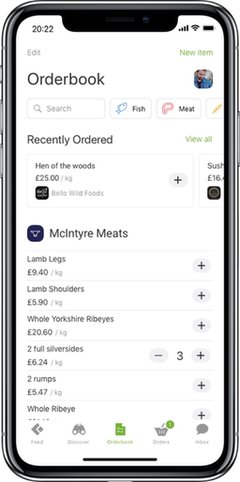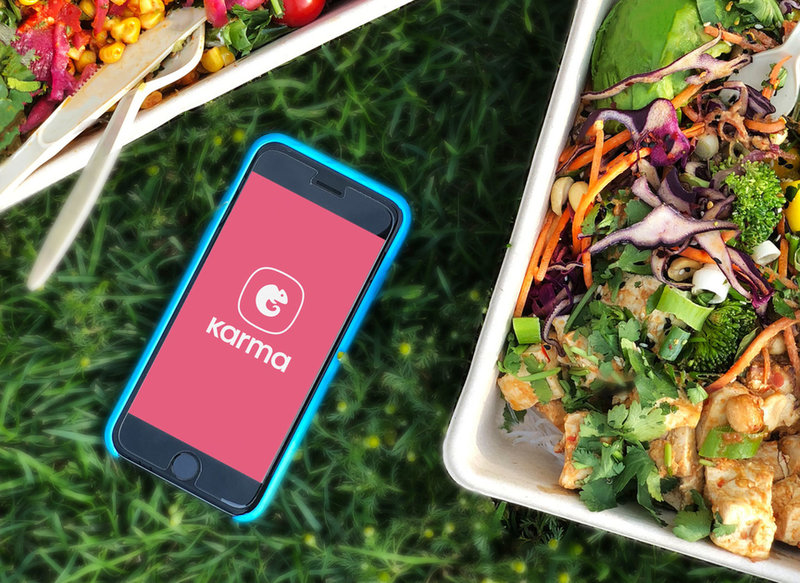The foodservice and hospitality sectors have been severely impacted by the Covid-19 outbreak. The closure of restaurants, cafes, bars and pubs has, understandably, had a huge knock-on effect not just on those businesses and their workers, but also on the supply chains and suppliers who work with them.
Elsewhere in retail, empty supermarket shelves have become a more common site across the country. Recent figures from Nielsen indicate that UK shoppers bought an extra £1.9bn of groceries and personal goods in the four weeks ending 21 March 2020.
But whilst shortages are partly due to panic buying, they are also a consequence of supermarket supply chains being disrupted by staff shortages and quarantine measures, which are restricting the movement of food.
Lucy Ingham and Peter Nilson highlight how, in the midst of all this, some businesses are finding new opportunities and using technology to launch new services, or similarly, pivoting in new directions.
Pivoting to home delivery: how supplier Foodchain is adapting
Even before the UK government ordered the closure of restaurants and cafes to combat the spread of the Covid-19 coronavirus, the disease was hitting hospitality hard. But, for suppliers such as Foodchain, the decision was a major blow. Lucy Ingham explores how the company has adapted to the disruption caused by the coronavirus outbreak.
“Our community is entirely based on supplying restaurants and seeing them all shut their doors one by one was devastating,” says Amelia Christie-Miller, head of sales of marketing at Foodchain.
Used by chefs at some of the UK’s most highly rated restaurants, Foodchain is an app that connects small suppliers with chefs, enabling them to order fresh, high-quality food sourced from specific growers and farmers, which is delivered overnight to their restaurants.
The restaurants can then tell their customers exactly where the food they are eating has come from, providing complete supply chain transparency.

Image: Foodchain
But with the coronavirus forcing restaurants to close, Foodchain is suddenly without much of its customer base. However, it saw a new opportunity emerging in the home delivery space.
“Two weeks ago, my flatmate was in isolation after coming back from Italy. She went onto Sainsbury’s website for delivery and couldn’t get one until Tuesday,” explains Christie-Miller.
“Meanwhile, I can get beautiful veg delivered to my door overnight through our app – that’s when I saw the opportunity.”
Switching to home deliveries amid the coronavirus crisis
Foodchain took the decision to open up its platform to consumers, providing support for home delivery, however, there have been challenges posed by the differences in what the average home needs compared to a 200-cover restaurant.
“We’ve built the product to complement a B2B, restaurant account. This means customers have the option to buy 12 balls of London artisan buratta or a sack of onions weighing 20kg – rather than what they need which is small portions of many different products,” says Christie-Miller.
However, the efforts Foodchain has made to adapt to consumer demands during the coronavirus outbreak have so far proved worthwhile.
“It’s so rewarding to see both our suppliers getting traction and the consumers we serve getting produce,” she says.
“So many people are over the moon just to get a nice box of food at their door!”
Transition at Foodchain
On the operational side, Foodchain has not seen a dramatic shift in how it operates, as the company has always been run by a remote team.
However, Christie-Miller says that they have joined many other companies in making considerable use of Zoom, and have also changed how they take payments to better support their new customer base.
“We’ve also started taking STRIPE payments which are more in-line with consumer purchasing.”
So many people are over the moon just to get a nice box of food at their door!
But with Foodchain only initially making the switch temporarily during the coronavirus outbreak, could the company make home delivery a permanent part of its offering?
“Potentially – but it depends entirely on whether the virus will have a long-term impact on consumer buying,” says Christie-Miller.
“I think when consumers realise they can get a beautiful box of restaurant-quality veg for the same price as Tescos, delivered to their homes, it’ll be hard to go back to traipsing the aisles of their local store.”
How FruPro is fighting food waste
Startup FruPro has released a not-for-profit platform to combat food waste during the Covid-19 coronavirus outbreak that could potentially help feed half a million people in just two days with food previously destined for the bin. Peter Nilson takes a look into the operation.
When it comes to food waste and scarcity, there is something of a dichotomy in the food system, which has been made more prevalent by the coronavirus.
We’ve seen empty supermarket shelves, with shoppers sorely missing the variety in products they have grown accustomed to. However, stocks of fruit and veg are currently sitting idle in warehouses across the UK amidst supply chain disruption. Elsewhere, fresh produce is spoiling in the fields due to a workforce shortage in the agriculture industry.
This current landscape has worsened an already pressing concern in the food industry: estimates are that up to 40% of fresh produce grown in the UK is wasted.
Combating food waste during the coronavirus crisis
Hounslow-based start-up FruPro has launched a not-for-profit version of its communication and trading platform, which connects food growers with retailers.
The goal is to reduce waste by creating a centralised platform that puts those with produce in touch with those who need it.
“The key thing for us is that no food ends up in the bin,” says William Hill, CEO of FruPro. “Despite empty supermarket shelves, there is a huge amount of fresh produce available because many wholesalers sell directly into the hospitality sector – which has closed down. The issue now is getting that food to retailers."
Reynolds, a leading supplier for the foodservice industry, is one of the platform’s earliest participants.
The key thing for us is that no food ends up in the bin.
FruPro facilitated the diversion of 180 tonnes of fresh produce to independent retailers and wholesalers across the country, by helping Reynolds find buyers in the retail sector through food marketing company WT Hill.
“FruPro have been a great help to Reynolds in ensuring that we have been able to divert produce, which might have otherwise gone to waste, to people who really need it,” says Matthew Jones, a senior buyer at Reynolds. “Now more than ever it’s important that our industries work together to prevent food shortages and minimise any wastage”.
Currently, FruPro is focusing on diverting produce to independent retailers – food markets, corner shops and smaller greengrocers, as well as the growing fresh produce delivery sector.
The company is also developing a mechanism for transferring stock to food banks.
“Supermarkets do a great job, but we also need to support our independent retailers and charitable organisations,” adds William. “These businesses don’t have the levels of bureaucracy and regulation that you see in supermarkets. This means that we can get stock to them quickly – and then on to the general public.”
Targeting an international release
Eventually, FruPro does plan to take a commission from these trades; but in light of the disruption caused by Covid-19 the company has decided to launch the not-for-profit version in order to expedite access.
The full version of the platform is still some months away from being ready for a full release, which FruPro plans to make international to reflect the complexity of supply chains.

Image: Frupro
In order to achieve this upscaling to an International level, FruPro is currently in talks with Agrimetrics, an artificial intelligence and data platform backed by the UK Government and Microsoft.
“In a couple of years, we want everyone to be able to buy fresh fruit that would otherwise have ended up in the bin, and be able to track that piece of fruit back to the farm that produced it: complete traceability,” concludes William. “Over the next few months, we want to make sure that no one goes hungry whilst good food is being wasted.”
How Slerp is helping hospitality switch to takeaway models
As Restaurants and Cafes in the UK are forced to either close their doors or pivot to takeaway models, Lucy Ingham looks at how Slerp is helping the hospitality sector try to stay afloat.
From silver service establishments to boutique cafes, a plethora of businesses that would have never previously considered offering delivery and collection services are now doing so, and in the process are adopting new platforms to facilitate the ordering and delivery process.
For the close-knit world of independent hospitality, established giants such as Deliveroo are often not appealing due to the requirements they place on businesses; the lack of integration they offer with existing websites and the level of commission they can sometimes demand.
As a result, many of the new-to-takeaway companies are instead turning to a relative newcomer: Slerp. Founded by JP Then, the founder of Crosstown Doughnuts, Slerp was initially rolled out for London businesses in 2019 after a two-year trial.
Promising lower commission fees, greater control and the ability to either absorb delivery costs or pass them onto customers, it has proved increasingly popular with independent companies, particularly in the past few weeks.
“Over seven days we have seen a significant increase in inquiries coming in from a variety of businesses,” says JP Then, founder of Slerp. “These range from multi-site operators to local independents across all food and drink types.”
Supporting the hospitality industry’s coronavirus-led pivot to takeaway
For Slerp, the weeks following Boris Johnson’s announcement that bars, restaurants and pubs should close have been anything but relaxed, as the company scrambles to provide the support to hospitality companies entering the world of takeaway for the first time, while its own employees work from home.
But for Then, it has been an opportunity to help an industry that is struggling to survive in the wake of the coronavirus crisis.
“We are working around the clock, seven days a week onboarding these businesses to our platform so they can keep a revenue stream coming in and an ability to retain as many employees as possible and give them hope of survival,” he says.
“This is obviously an unprecedented situation and we are in a rare position where we can instantly assist and have someone set up with an online store within a day.
“We have waived all set up fees and will continue to react as fast as possible. This is about banding together and helping the sector as best as we can.”
Saving hospitality industry jobs
While much of Slerp’s operational time has been taken up by a surge in new customers, it has also worked to update its offering in a bid to save some of the jobs that have been lost within the hospitality industry.
This takes the form of a new option for delivery, in addition to the outsourced couriers that are currently used, where staff not required for takeaway services can be kept on to make deliveries instead.

Image: Slerp
“We are enabling our technology to allow for businesses to undertake deliveries themselves, or outsource to a third-party (which our technology automatically does),” explains Then.
“Many operators are signalling they have capacity to turn their idle staff into couriers in an attempt to save their jobs.”
Providing hospitality safety during the coronavirus crisis
In addition to adjusting its offering to help safeguard hospitality industry jobs, Slerp has also rolled out measures to help protect its couriers from the coronavirus.
“We have enabled contactless delivery as an option, providing a custom note field for the end-customer on the checkout solution so that they can enter any delivery requirements,” says Then.
“This information is passed on to the courier. Ensuring safety for all involved is the top priority.”
Slerp has been rapid to pivot to respond to the changing state of hospitality during the coronavirus, and Then is open to the fact that the next few months remains relatively unknown.
“The landscape has shifted dramatically and extremely quickly. I don’t think anyone can speak with confidence to say how long this situation will last for,” he says. “However, a need for offering online ordering will be essential.”
How Karma switched to deliveries
In the last few years, a variety of startups have taken on the issue of food waste, with app Karma being one of the most prominent players in the space. Lucy Ingham finds out how the closure of restaurants and cafes has caused Karma to rapidly change its offering.
Prior to the coronavirus, Karma helped consumers and restaurants in countries including the UK and Sweden fight food waste by enabling companies to sell surplus meals and snacks at a reduced price through its app.
Consumers would select the items they wanted in the app, and then go and collect them from the restaurant in question.
But the outbreak of Covid-19 has caused significant temporary problems for that model.
“The Covid-19 outbreak (and subsequent lockdown in most markets) has made our regular Karma user experience temporarily less attractive. Many of our partners, both big and small, have been struggling with their sales due to the decrease in footfall,” says Hjalmar Ståhlberg Nordegren, CEO and co-founder of Karma.
“Some have decided to pause all their activity, which has a direct impact on their business and reduced the inventory of food surplus available through Karma. This means that most food waste during the crisis is happening further up the food chain, for example with wholesalers who usually work to supply the hospitality sector.”
Karma pivots to delivery to combat coronavirus food waste
With over one million regular app users and more than 7,500 partners selling through its app, Karma was faced with coming up with a new approach that was better suited to the post-coronavirus world: delivery.
“As a response, Karma has been working quickly in both Sweden and the UK to adapt our model to accommodate these extraordinary circumstances. We believe that our unique situation gives us the opportunity to support the hospitality sector and take a more proactive approach to reducing food waste,” says Nordegren.
“For the restaurants, cafes and stores that have chosen to stay open during this difficult period, waste is even more of a problem right now as people are staying inside. To combat this, we have built a new delivery system so that we can get this surplus food out to users across both Stockholm and London.
“For our users in lockdown or in self-isolation, this is a way to give them easy access to a variety of restaurant cooked meals as other delivery apps are overwhelmed with demand.”
But that is only the start. In response to the difficulties many consumers are facing in booking grocery deliveries, as well as the growing food waste issue occurring among wholesalers, the company is also launching a fruit and vegetable box dubbed the Karma Box.
“We have also launched a number of other initiatives that we are really excited to get off the ground. In Sweden, we have launched a Karma Box that delivers essential fruit and vegetables to households across Stockholm, amidst the closure of many restaurants,” he says.
The Karma Box was launched in London soon after, buoyed by registered interest from "over 5,500 potential customers.”
Inside Karma: The importance of being agile
Such a rapid change of offering is not an easy thing to pull off, but Nordegren says that the company’s values made it well-placed to pivot in the way it has.
“We have always been very flexible and open to change at Karma. It is part of our DNA (our core values are actually User First, Fast Movers and Pioneers),” he says.
“So, in some ways, the challenges have been an amazing reminder for the team that we can actually execute very quickly and launch completely new business avenues in a matter of days.”
That’s not to say there haven’t been issues.
“Of course, every new initiative comes with its own complexities: from product and tech right through to how we share it with our customers. This is especially the case during the current period of remote working, where our teams are not in one place together,” he explains.
“What we will keep with us from this situation is that we should always be agile enough to launch imperfect new features, which can be iterated on fast to respond to the needs of our customers and the environment.”

Image: Karma
There has also been a need to ensure the health and safety of Karma staff – both those working remotely and those doing deliveries – during the coronavirus outbreak.
“As a company, we take the health and wellbeing of our team extremely seriously. With that in mind, we have been following government guidelines across our markets to ensure that each member of staff is protected and able to operate safely from home,” says Nordegren.
“Within our product, we have also laid out strict no-contact guidelines for our restaurant partners and delivery operators to ensure that both they and their customers are protected from the potential spread of coronavirus.”
Karma after the coronavirus: Building a remote culture
In order to keep its business running effectively during the coronavirus outbreak, Karma has looked to technologies it was already making use of in its normal operation.
“As a tech company, and one operating in multiple markets, we are comfortable with using remote technologies such as Slack and Google Hangouts to stay in touch with one another,” says Nordegren.
“However, now more than ever this form of communication has become an essential part of Karma – not just in how we operate, but in how we maintain our distinct culture. Our ethos and spirit have always been an essential part of what it means to work at Karma, and we are finding new ways to keep that alive despite being apart.”
But does Nordegren see the changes the company makes now being longer term practices for Karma?
“Absolutely, forcing people into these new conditions (social distancing, working from home and limiting movement) will likely shift behaviour in the market in such a way that we’ll see increased usage of delivery platforms for both ready to eat meals and groceries as well as provide a more remote friendly work-life,” he says.
“What that means to us is that we’ll likely be more flexible with remote working; make sure we follow the macro market trends; are able to adapt how surplus is saved and consumed by offering delivery through third parties and continue to provide the Karma Box filled with surplus delights from across the food value chain and not just from restaurants and grocery stores.”
It has also caused the startup to look more carefully at its measures of long-term success.
“We will also, like most startups, be more aware that growth on its own is just a VC metric and that growth paired with profitability is a much more sustainable way of running a business,” he says.
“This might seem obvious to many, but it’s not how the startup sector has been operating given the ready access to capital and the ease of delaying profitability to ‘someday in the future’.”